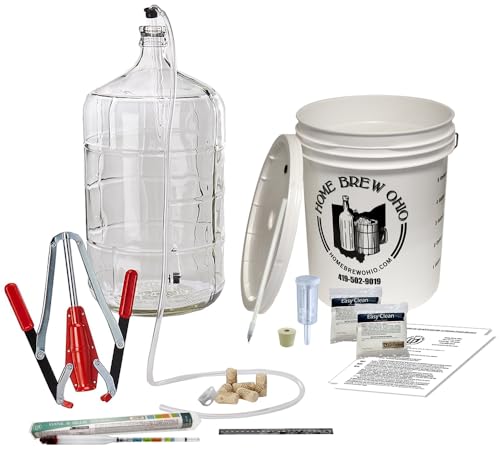noahkain1998
Junior
I've been making wine for about 5 years now. I've always added bentonite after fermentation was complete, but my brother noticed something over the years that I might be starting to agree with.
He pointed out that a lot of my wines taste the same. No matter what fruit I'm using—whether it’s grapes, mango, cranberry, you name it—they tend to have a similar flavor. I kind of have to agree with him. They taste great but are a little too similar at times. I did some research and read that bentonite can unintentionally remove flavors from wines. I'm sure I'm using the correct amount per gallon, so I decided to test something. My favorite kind of homemade wine is made from store-bought grape juice (I know, I'm basic), but I love the idea of a wine that just tastes like grape juice. For this batch, I didn’t add bentonite at all, and it started to clear by itself after some time.
I was curious so I tried cold crashing for the first time, but it clouded back up immediately when it got cold. I cold-crashed it for 24 hours anyway and brought it back to room temperature. I'm not sure if this is chill haze, protein, or maybe some potassium tartrate.
Anyway, despite the wine re-clouding, the smell is straight-up grape juice with an ABV of 14%. When I add bentonite to the same recipe, I don’t get that strong hit of grape aroma anymore. But this time, I had a huge grape aroma, and when I tasted it, it was literally adult grape juice. I can’t stress that enough—it was great.
Now I'm wondering: should I even use bentonite anymore? Would bentonite be less destructive to aroma compounds if I added it at the beginning of fermentation? I’m trying not to be too strict about having clear wine, but the more I do this hobby, the more I prefer it to be clear.
I've also noticed that bentonite has a negative electrical charge and sometimes does not work and I have to resort to using chitosan which has a positive charge to get the rest. This happens rarely but I can recall a few times where it was necessary.
What do you guys think?
He pointed out that a lot of my wines taste the same. No matter what fruit I'm using—whether it’s grapes, mango, cranberry, you name it—they tend to have a similar flavor. I kind of have to agree with him. They taste great but are a little too similar at times. I did some research and read that bentonite can unintentionally remove flavors from wines. I'm sure I'm using the correct amount per gallon, so I decided to test something. My favorite kind of homemade wine is made from store-bought grape juice (I know, I'm basic), but I love the idea of a wine that just tastes like grape juice. For this batch, I didn’t add bentonite at all, and it started to clear by itself after some time.
I was curious so I tried cold crashing for the first time, but it clouded back up immediately when it got cold. I cold-crashed it for 24 hours anyway and brought it back to room temperature. I'm not sure if this is chill haze, protein, or maybe some potassium tartrate.
Anyway, despite the wine re-clouding, the smell is straight-up grape juice with an ABV of 14%. When I add bentonite to the same recipe, I don’t get that strong hit of grape aroma anymore. But this time, I had a huge grape aroma, and when I tasted it, it was literally adult grape juice. I can’t stress that enough—it was great.
Now I'm wondering: should I even use bentonite anymore? Would bentonite be less destructive to aroma compounds if I added it at the beginning of fermentation? I’m trying not to be too strict about having clear wine, but the more I do this hobby, the more I prefer it to be clear.
I've also noticed that bentonite has a negative electrical charge and sometimes does not work and I have to resort to using chitosan which has a positive charge to get the rest. This happens rarely but I can recall a few times where it was necessary.
What do you guys think?



















































